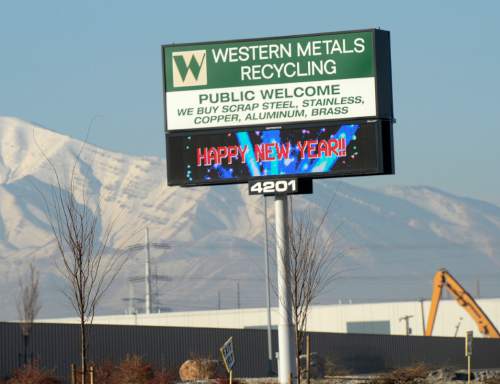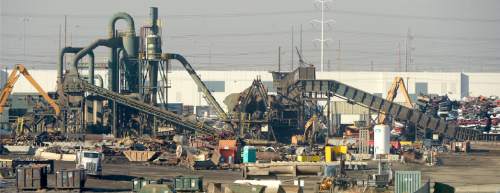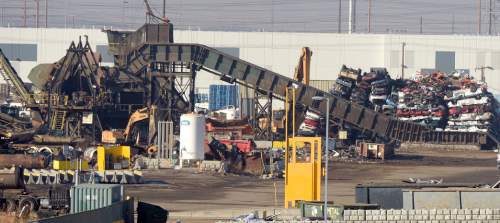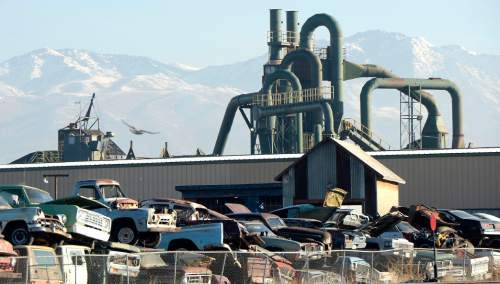This is an archived article that was published on sltrib.com in 2015, and information in the article may be outdated. It is provided only for personal research purposes and may not be reprinted.
Utah environmental regulators first started documenting an oil slick seeping from old cars at a large Salt Lake City scrap yard three years ago.
But after harsh pushback from Western Metals Recycling — including claims the investigation was driven by a state inspector's vendetta — the Department of Environmental Quality only recently reached a settlement with the company. The fine: $17,600.
The deal only partially resolves the charges against the metal recycler, a key supplier to Nucor Steel in northern Utah.
But while the case remains open, the settlement is open to public comment through Jan. 20.
Inspectors first noted violations at Western Metals' scrap yard in 2012.
Early the next year, state environmental regulators charged the company with failing to properly contain old motor oil after an inspector found it leaking onto the ground and oily water pooling and draining into an unlined retention pond, potentially contaminating groundwater.
She also discovered contaminated soil stockpiled on the southeast corner of the yard at 4221 W. 700 South.
But when inspectors returned to collect soil and water samples, company officials refused to allow them access as required by their permit, the state alleges.
Nevertheless, under the deal released last month, Western Metals resolved three of the four violations listed in the DEQ notice of violation.
As is the case with all negotiated settlements with the state, the company is conceding no wrongdoing by agreeing to a fine.
In its response to the state's notice, Western Metals has rejected the allegations, describing them as the handiwork of an "over-zealous" inspector who "harbors ill-will and animus" toward the company and its employees.
"Without a reasonable basis, the inspector singled out Western Metals and had engaged in a pattern of escalating harassment, threats, and intimidation," its lawyers wrote. "The inspector is treating Western Metals differently than other similarly situated competitors."
The case has been bogged down in a contentious administrative review for more than 18 months.
Company managers asked Solid and Hazardous Waste Division Director Scott Anderson to toss the violations. Anderson declined comment because the case remains under litigation.
The same year of the alleged oil-handling violations, the Utah Department of Labor honored Western Metals with an award for the company's exemplary commitment to workplace safety.
The firm, owned by Ohio-based David J. Joseph Co., is the largest metal recycler in the Rocky Mountain region and is a key supplier to Nucor's steel plant in Plymouth. Joseph is a Nucor subsidiary and it also operates scrap yards in Provo and Ogden. Last year Joseph acquired Sims Metal Management's yards in Salt Lake City and Orem.
The proposed settlement does not resolve a fight over oil filters. The state's hazardous waste division contends Utah law requires filters to be removed from scrap cars and drained.
But the company argues oil filters are best left attached, lest oil seep from the engine block.
"Removal of oil filters at the auto salvage facilities prior to crushing the cars would significantly threaten human health and the environment," the company wrote. "After inquiring with metal recyclers in more than 30 states across the country, Western Metals has not found any other state that requires removal of oil filters prior to recycling by shredding...
"The added cost and expense of this dangerous activity would render Western Metals' recycling business unviable."
Western Metals officials said the company follows procedures to contain as much oil as possible and conducts regular inspections so that problems can be addressed promptly. Any oil striking the ground is minimal, the company argues, not subject to laws prohibiting oil dumping.
Western Metals officials declined to comment on the particulars of the case, but provided a written statement.
"Western Metals has operated and continues to operate its facilities in compliance with law and best practices," company president Jeffrey Davis said. "Western Metals has invited DEQ to the facility many times since the initial inspection and looks forward to an ongoing positive relationship.
"Recycling greatly benefits the environment," he added. "Western Metals and DEQ share this common goal."
DEQ took action after four site visits in 2012. In March 2013, the inspectors returned with staff from the Salt Lake County Health Department to collect water and soil samples. But Western Metals officials refused to allow them access — itself a violation of state law.
The company responded that it merely insisted on advance notice so that its consultant could be present when samples are gathered.
In filings, state officials said they do not need to give advance notice, but they declined to tell the Tribune whether any samples were eventually taken at the scrap yard.
The 2013 incident was among others involving metal recyclers that prompted the Salt Lake County Health Department to craft local rules governing scrap yards.
There are about 30 metal salvagers in the county.
"We regulate all sorts of waste processors and metal recycling is not one of them," said Nicholas Rupp, a health department spokesman. "We have a potential regulation coming up in the next year."









